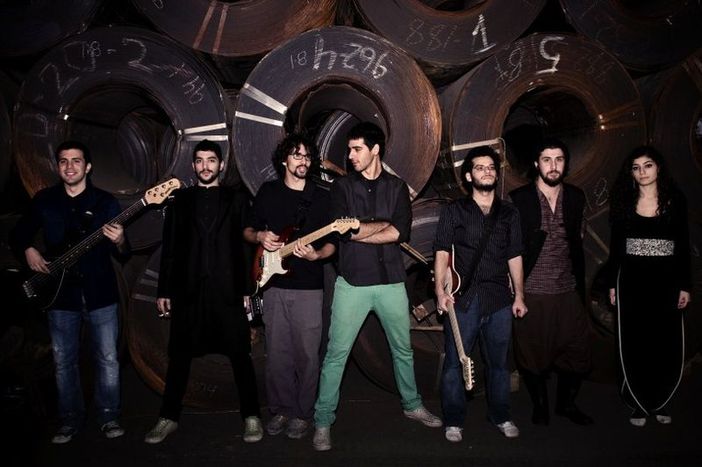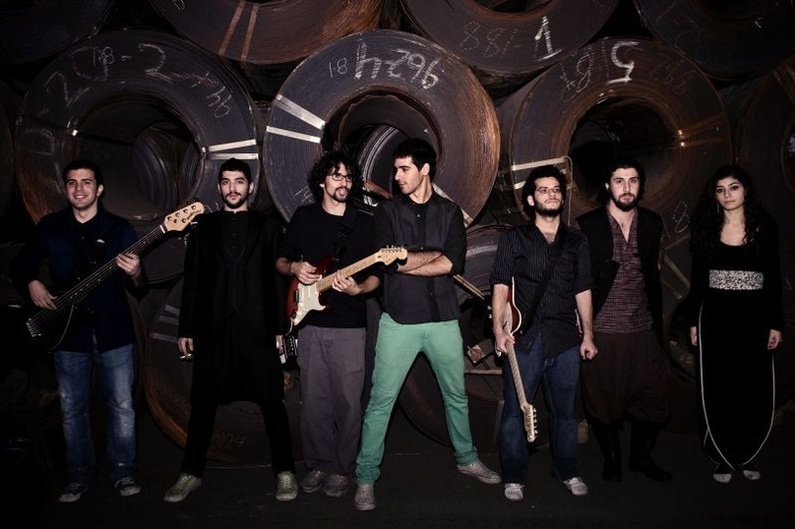
Mashrou' Leila: "The media trivialises the Arab world"
Published on
Translation by:
Maria-Christina DoulamiFrom the "voice of the Arab Spring" to "champions of the LGBT cause" in the Middle East.
There have been many labels attributed to Mashrou' Leila. But how many of them are true? We try to go beyond the stereotypes in this interview with the most famous pop group in Beirut.
They walk slowly, gazing up in admiration at the ceiling of the Palazzo Graneri della Roccia, their voices subdued by the creaking of the floors: Mashrou' Leila have placidly reached the press room. They are dressed up all in black and appear full of admiration for the place that is hosting them, almost like being on a school field trip. Yet, they are the real attraction. The room is packed. They are already one of the most popular bands from the Middle East.
How did they arrive here? In 2008, three students from the American University of Beirut (AUB) formed a music group; but lacked a voice. Hamed Sinno thrashed the competition during auditions for the role of lead singer and soon the group was complete. The popularity of Mashrou' Leila (ed. into English as "Overnight project".) grew at a staggering rate thanks to the attractive strategy of crowdfunding and the growing influence of the Internet on the music industry. Within six years they recorded three albums: Mashrou' Leila (2009), El Hal Romancy (2011) and Raasük (2013).
At the Circolo dei lettori (trans. as Circle of Readers) in Turin, it is Hamed who takes the floor to tell their story and answer questions from the public. The other members of the group inject in turn their own responses as if they were solos of a song. Occasionally, one of them laughs under their moustache, as if to downplay the seriousness that transpires from the subdued voice of Hamed.
A question of language
Mashrou' Leila decided from the beginning to sing in Arabic (also listen to the beautiful cover of "Get Lucky" with Nile Rogers). Yet, as recounted by Hamed, “during the AUB we spoke better English and French.” How can their choice be explained? “In post-colonial societies, the language you speak depends on social origins and the past of your country,” explains Hamed, and continues: “The chouce to sing in Arabic was a consequence – we didn’t want to represent an elite.” Haig Papazian (violin) - remembers that during his childhood, "it was impossible to listen to Arabic songs that addressed politically controversial issues." So was this a carefully designed revolutionary strategy? "It would be hypocritical if we confirmed this idea," confesses Hamed. “First, we did it for ourselves. We also wanted to talk especially to the people of our country. We did not expect to reach the global marketplace.” Ibrahim Badr (bass) on his part added that the “sound was just perfect.”
Beyond labels
Little does it matter. For all media, Mashrou' Leila have become "the voice of the Arab Spring." What do they think of this? See the video (subtitled in Italian, ed.).
Photo Credits (in order of appearance in the video): Saleem Al Homsi, Shakeeb Al Jabri, Chris Belsten, Caruso Pinguin, Bundniss 90 Die Grunen, Al Hussainy Mohamed.
For Hamed the comparison to Freddy Mercury arrives early. Why? He has a great voice and is homosexual. Especially thanks to the song Shim El Yasmine, Mashrou' Leila are defined as the champions of the LGBT cause in Arab countries - it's another label that is tied to Hamed. "Our lyrics revolve around conflicts of various kinds: from political ones to class, passing through religious ones and reaching the most intimate politics of the individual," he says.
Already, the weight of responsibility on the band is quite large. It seems that an entire Arab generation is breathing down their neck. Hamed downplays this and appears eager to please: "Yes, we have a beautiful audience, as they are also here in Turin tonight." Haig explains that "their songs are part of the artistic tradition of Arab 'social realism', which was born at the beginning of the '900s." “We simply never had them air on the radio before," he continues. This is also why Hamed pronounces playing with words: "Our audience, after all, is the same as fifty years ago."
Flying with feet on the ground
Mashrou' Leila points fingers towards the press - both Western and Arab - when they speak of the labels that have been attributed to them. And although they admire "the efficiency of public infrastructure and the care given to cultural heritage that you encounter along the streets” in Europe, on the other hand, they accuse our continent "of trivialising the Arab world and its people.” It may be to diffuse the moment that Haig this time throws in something grotesque: "Once we were made to play in a tent in which a flying carpet had been set up" – the room did not hold back its laughter. On one point they all agreed: "Six years ago, no one would ever expect to have so much success." One wonders if there are still goals to reach. “We'd love to play in Syria and Palestine,” they admit. The dining room bursts into applause.
After all, the metaphor of the flying carpet fits well: on the one hand Mashrou' Leila know that it is right to make their audience dream and fly. On the other hand, they must be prepared to remain firm on the ground, trying not to be oppressed by stereotypes.
Translated from Mashrou' Leila: «I media banalizzano il mondo arabo»



